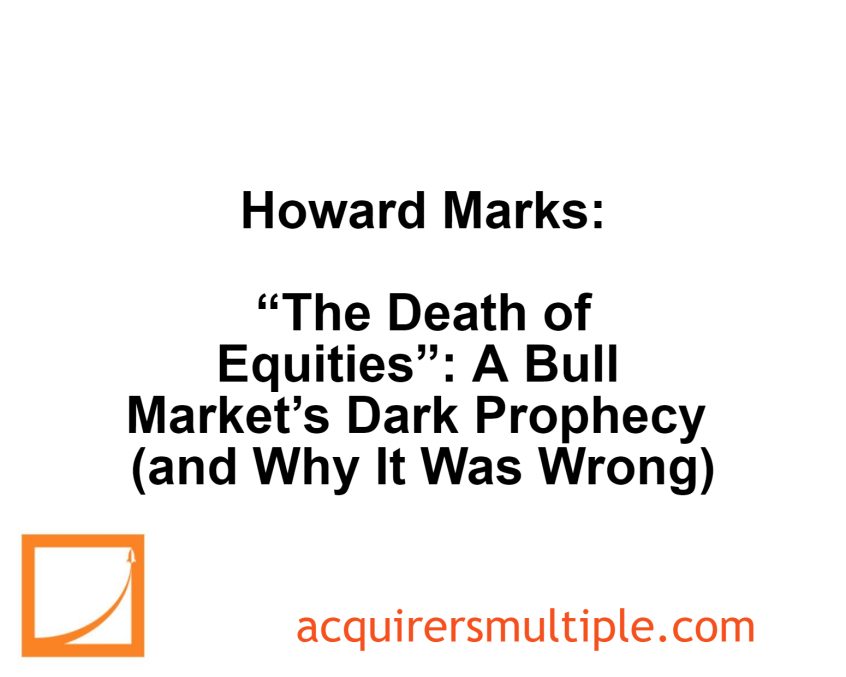In his book Mastering The Market Cycle, Howard Marks discusses a 1979 Business Week article titled “The Death of Equities”. The article highlights how popularity (or lack thereof) of an asset class can be a powerful indicator for future performance. After a decade of poor stock market performance, the article predicted the demise of stocks. Ironically, the article marked the prelude to the greatest bull market in history, proving the point that investors should be cautious of popular assets and seek opportunities in the unpopular.
Here’s an excerpt from the book:
Perhaps the greatest example of the influence of popularity (in reverse) was seen in 1979, and few investors who were around at the time have forgotten it. On August 13 of that year, after almost a decade of painfully poor performance on the part of stocks, Business Week magazine published a cover story entitled “The Death of Equities.” Its conclusion—that stocks were done for—was based on the opposite of everything recommended in this book.
The article cited a litany of reasons why the poor performance of stocks would continue unabated:
- Seven million people had given up on investing in stocks.
- Many other forms of investment had done better.
- Pension funds were turning to “hard assets” like gold.
- Inflation had sapped corporations’ ability to increase profits.
It went on:
Even institutions that have so far remained in the financial markets are pouring money into short-term investments and such “alternate equity” investments as mortgage-backed paper, foreign securities, venture capital, leases, guaranteed insurance contracts, indexed bonds, stock options, and futures.
And here was its conclusion:
Today, the old attitude of buying solid stocks as a cornerstone for one’s life savings and retirement has simply disappeared. Says a young U.S. executive: “Have you been to an American stockholders’ meeting lately? They’re all old fogies. The stock market is just not where the action’s at.”
In short, what “The Death of Equities” said was that stocks had become so unpopular that they would never do well again.
It takes a highly simplistic first-level thinker to conclude that poor past performance has led to unpopularity today, which implies poor performance tomorrow.
Rather, the insightful second-level thinker says poor past performance has led to unpopularity today, which implies low prices today, which in turn implies good performance tomorrow.
“The Death of Equities” was published just a few years before—and in essence laid out the entire case for—the 1982 kickoff of the greatest bull market in history.
At the time it was published, the S&P 500 stood at 107, and in March of 2000 it reached 1527. That’s a price gain of more than 14 times, or 13.7% per year for almost 21 years (and those figures ignore dividends, which took the total gain to more than 28 times and the annualized total return to 17.6%).
The lesson is simple: investors should be leery of popular assets. Rather, it’s unpopularity that is the buyer’s friend.
You can find a copy of the book here:
Howard Marks -Mastering The Market Cycle
For all the latest news and podcasts, join our free newsletter here.
Don’t forget to check out our FREE Large Cap 1000 – Stock Screener, here at The Acquirer’s Multiple:



